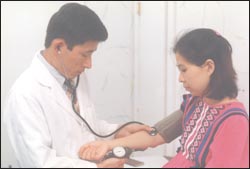그 다음 정기 임신 검진을 받으러 병원에 갈 때 When to go for the next pregnancy examination

임신 중 정기 건강 검진을 받을 때 혈압을 잰다
임신해서 분만할 때까지 얼마나 자주, 또 몇 번 정도 임신검진을 정기적으로 받아야 하는지 일률적으로 정할 수 없다.
정기 임신검진을 받는 방법, 횟수, 검진 받을 때 해야 할 임상검사는 나라 지방 임신부와 태아의 건강상태, 임신횟수, 임신 합병증의 유무, 의사, 그 외 다른 조건에 따라 조금씩 다르다. 그렇지만 일반적으로 임신해서 분만할 때까지 다음과 같이 정기 임신검진을 받도록 권한다.
임신이 정상적으로 잘 진행될 경우는 임신 첫 6개월 동안에는 매달에 한 번 정도, 임신 7〜8개월 동안에는 매 2주에 한 번 정도, 해산달 초부터 분만할 때까지는 1주에 한 번 정도 임신검진을 받도록 권장한다.
정기 임신검진을 받을 때마다 임신이 정상적으로 순조롭게 진행되고 있는지 알아본다. 임신부의 체중과 혈압을 재고, 필요에 따라서 소변검사와 피검사를 한다.
태아가 잘 성장발육 하는지 알아보기 위하여 태아의 심장 박동소리도 들어보고, 임신부의 배가 불러지는 정도도 알아본다. 그리고 태아 울트라사운드 검사도 해본다.
정기 임신검진을 받을 때마다 내진이나 피검사를 꼭 받을 필요는 없다. 임신검진은 그때그때 조금씩 달리하고 또 임상검사도 필요에 따라 조금씩 달리한다. 임신검진을 받으러 병원에 가기 전에 임신, 분만, 산후회복, 육아법 등에 대한 어떤 질문이든 걱정거리가 있으면 그것을 적은 메모지도 가지고 가서 의사나 간호사에게 질문하면 좋을 것이다.
임신부가 맨 처음 임신검진을 받으러 병원에 갔을 때 의사나 간호사가 임신부와 남편의 과거와 현재의 병력을 다 알아보지 못했을 때는 두 번째 정기 임신검진을 받으러 갈 때 의사나 간호사가 첫 임신검진을 할 때 전 번에 다 알아보지 못한 나머지 병력을 더 완전하게 알아본다.
그리고 임신을 안전하게 할 수 있도록 도와주고 임신부가 최상의 건강상태에서 건강하게 아기를 순산할 수 있도록 돕기 위해서 임신부와 남편의 양가의 가족들 중 누가 어떤 유전성 병을 가지고 있는지, 현재 어떤 병을 앓고 있는지 등등의 가족병력에 대해서도 자세히 알고자 한다.
예를 들면, 임신부나 남편, 또는 부부의 가족들 중 누가 당뇨병, 신장 질환, 갑상선 질환, 호흡기 질환, 그 외 다른 종류의 급성이나 만성 질환을 앓고 있는지도 알아본다.
임신부나 남편의 가족들 중 누가 과거나 현재에 급성 또는 만성 전염성 질환을 앓고 있으면 그 전염병이 임신부나 태아에게 감염될 수 있는지, 유전병이 있으면, 태아나 아기가 그런 병에 걸리지 않게 예방해 주기 위하여 임신검진을 더 자세히 하고 적절한 임상검사도 한다.
임신부가 어떤 병을 앓으면 그 병을 조기에 적절히 진단 치료하여 건강한 아기를 순산할 수 있도록 적극적으로 도와준다.
Copyright ⓒ 2014 John Sangwon Lee, MD., FAAP
When to go for the next pregnancy examination 그 다음 정기 임신 검진을 받으러 병원에 갈 때

Blood pressure is taken during regular health check-ups during pregnancy
- It is impossible to uniformly determine how often and how many times pregnancy check-ups should be performed regularly from pregnancy to delivery. The method, frequency, and clinical tests to be performed at the time of regular pregnancy check-ups are slightly different depending on the health status of pregnant women and fetuses in the country, the number of pregnancy, the presence or absence of pregnancy complications, doctors, and other conditions.
- However, in general, it is recommended that you undergo regular pregnancy check-ups as follows until you are pregnant and deliver. If pregnancy is progressing normally, it is recommended to undergo a pregnancy check-up about once a month during the first 6 months of pregnancy, about once every two weeks during the 7-8 months of pregnancy, and about once a week from the beginning of the birth month to delivery. do.
- Whenever you get a regular pregnancy checkup, check to see if your pregnancy is progressing normally. The pregnant woman’s weight and blood pressure are measured, and urine and blood tests are performed if necessary.
- To find out if the fetus is growing and developing well, listen to the sound of the fetus’s heartbeat and find out the degree to which the pregnant woman’s belly is called.
- Also, do a fetal ultra-sound test. It is not necessary to undergo a seismic examination or blood test every time you receive a regular pregnancy checkup.
- Pregnancy check-ups are slightly different from time to time, and clinical tests are also slightly different as needed. Before going to the hospital for pregnancy checkups, if you have any questions about pregnancy, childbirth, postpartum recovery, and childcare, it would be good to take a memo with them and ask a doctor or nurse.
- When a pregnant woman goes to the hospital for the first pregnancy check-up When a doctor or nurse cannot find out all the past and present medical history of the pregnant woman and her husband
- When going to the second regular pregnancy check-up Before the first pregnancy check-up by a doctor or nurse The remaining troops were not fully recognized at one time.
- In addition, to help pregnant women safely get pregnant and to help the pregnant woman deliver a healthy baby in the best possible health, the family members of both the pregnant woman and her husband have any inherited diseases, what diseases are they currently suffering from, etc. I would like to know more about family medical history.
- For example, find out if a pregnant woman, husband, or family member of a couple has diabetes, kidney disease, thyroid disease, respiratory disease, or any other type of acute or chronic disease.
- If a pregnant woman or husband’s family member has an acute or chronic infectious disease in the past or present, whether the infectious disease can infect the pregnant woman or fetus, and if there is a genetic disease, pregnancy check-up to prevent the fetus or baby from getting such a disease
- More detailed and appropriate clinical tests are also performed. If a pregnant woman suffers from a disease, it actively helps to diagnose and treat the disease early so that a healthy baby can be delivered easily. Copyright ⓒ 2014 John Sangwon Lee, MD., FAAP
“부모도 반의사가 되어야 한다”-본 사이트의 내용은 여러분들의 의사로부터 얻은 정보와 진료를 대신할 수 없습니다.
“The information contained in this publication should not be used as a substitute for the medical care and advice of your doctor. There may be variations in treatment that your doctor may recommend based on individual facts and circumstances.
“Parental education is the best medicine.“